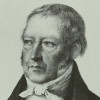“ When we have to do with the past and are engaged with a distant world, the mind sees rising before it a present, which it has from its own action as a reward for its trouble. ”
Georg Wilhelm Friedrich Hegel, Science of Logic (1816). copy citation
| Author | Georg Wilhelm Friedrich Hegel |
|---|---|
| Source | Science of Logic |
| Topic | action past |
| Date | 1816 |
| Language | English |
| Reference | |
| Note | Translated by William Wallace |
| Weblink | http://www.gutenberg.org/files/55108/55108-h/55108-h.htm |
Context
“Was ihr den Geist der Zeiten heisst,
Das ist im Grund der herren eigner Geist,,
In dem die Zeiten sich bespiegeln.
Cf. also Hegel, Werke, ix. 8. 'A second kind of reflectional history is the pragmatic. When we have to do with the past and are engaged with a distant world, the mind sees rising before it a present, which it has from its own action as a reward for its trouble. The events are different; but their central and [Pg 423] universal fact, their structural plan is identical. This abolishes the past and makes the event present. Pragmatic reflections, however abstract they be, are thus in reality the present, and vivify the tales of the past with the life of to-day.—Here too a word should specially be given to the moralising and the moral instructions to be gained through history,—for which it was often studied....”
source


